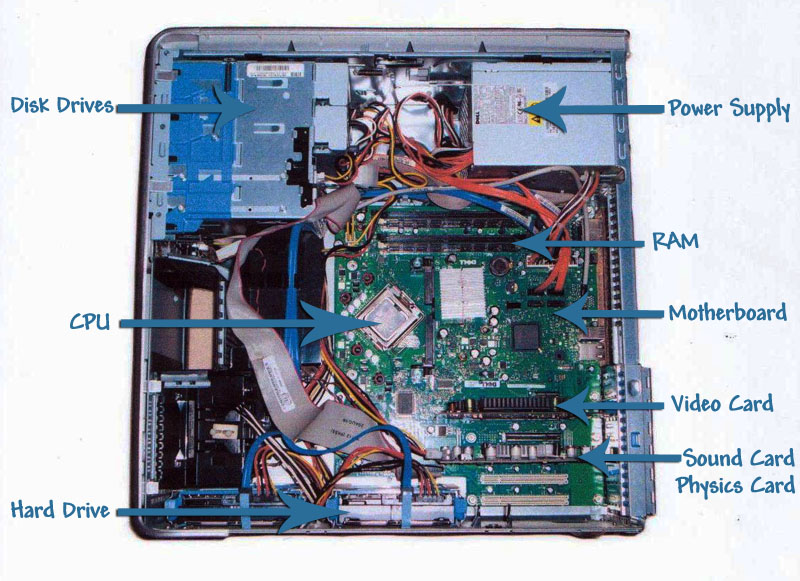COMPUTER
A computer is a machine which helps us to calculate, simulate and store different scenarios. For example, in order to write an e-mail, instead of paper and pen first we use a software (or program) called wordprocessor which helps us enter sentences through keyboard (Input), computer's screen (output) to read, and modem (output/input) to send it to a distant relative, friend, etc.
The mechanism to simulate a regular mail into an e-mail, gave us a very fast and much cheaper medium to communicate (not a simulation anymore). Same way, using computers we can simulate other things over which we do not have any control, for example weather, behaviour of atomic bomb, behaviour of a deadly virus, Earthquake, a innovative design for a new auto, airplane, machine, etc.
Any computer has five parts Input, Output, CPU, Memory, disk (storage) . Input is things like mouse, keyboard, modem. Output is computer screen, printer. CPU or central processing is brain of the computer which controls and execute all calculations, manipulations and output. Memory (RAM)is a temporary storage to be used by CPU when doing calculations, etc. Think of it as a scratch pad for CPU. Disk is permanent storage, on which all the software and data is stored.
When you turn on your computer, BIOS (or basic input output system) which resides on CMOS (complimentary Metal Oxide semiconductor,a type of chip) has small coded software written on it which tells CPU to read the next instruction from sector n of disk x.

Description
Though we have certainly entered a technological age, where computers are used in daily life for almost everything, only a small percentage of us are actually savvy enough to fix any glitches or tackle any problems that may arise when working with our computers. Luckily, we have computer service technicians, who we can call upon when the computers we rely so heavily on stop working the way we want them to.
These experts possess a background in electronics, but also know a lot about computers. This means that they can troubleshoot problems that arise, and can repair any internal systems malfunction, program problems or deconstruct and repair a computer or related technology. They also replace defective components on computers, items such as video or sound cards, which transmit signals betwen the computer and the monitor; hard drives, which store data; and network cards, which allow communication over the network. When they work for a company, they perform routine maintenance on the computers, like cleaning disk drives or dusting the insides and outsides of the computers. They may also sell and install computers and various systems, and then work as the repairer if the user encounters trouble.
Not only do computer service technicians need to be familiar with the actual makeup of the computer, but they also have to understand some of the software. They don't write software programs, but sometimes they install and upgrade existing programs and systems. They also need to be able to identify if the user's problems stem from faulty programs or internal systems, or whether it is the actual hardware that is malfunctioning. Computer service technicians should be able to tackle both issues for the client, eliminating any factors that prevent the computer from running smoothly.
Typical Tasks.
- Troubleshoot issues as they arise
- Collect information, research solutions, and analyze possible resolutions to issues
- Test and implement new solutions
- Evaluate resolutions for ways to prevent future problems
- Place follow-up calls to users about ongoing issues
- Care for all computer-related equipment, including workstations and printers
- Deconstruct and repair troublesome hardware, including computers, monitors, printers and security systems
- The typical day for a computer service technician will involve a lot of working with both computers and people. The computer service technician will ask a lot of questions about the problem, and experiment with the computer to try and find a quick, effective solution. Computer service technicians don't travel much, working from home or an office; however, if they work at a company they travel throughout the building, from computer to computer. They work in small teams of computer specialists, and alongside the workers in the company.